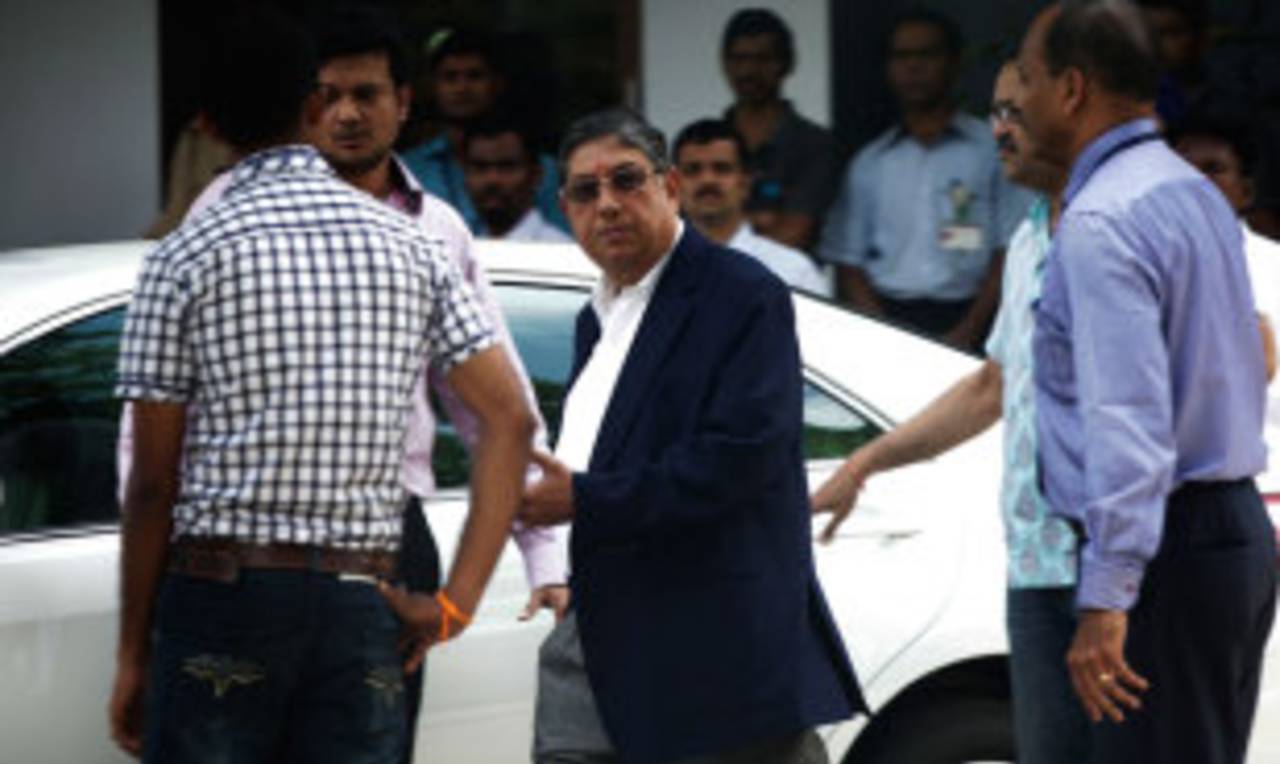It is the day before the IPL final; two-time champions Chennai Super Kings will play Mumbai Indians at Eden Gardens and the operations team is trying its best to ensure that Indian cricket's alternative universe will be in smooth functioning order.
Outside, it is anything but. Three cricketers belonging to Rajasthan Royals, who lost the second qualifier, will remain in a Delhi Police lock-up as the final is played. Hundreds of miles south, an official/owner/team principal of Super Kings will spend the night of the final with the crime branch of the Mumbai Police. The day before the game, rather than strut around Kolkata with the team, Gurunath Meiyappan was brought to court and formally charged with 12 violations of three separate laws.
The most emphatic, definitive piece of news on this day before the final was BCCI president N Srinivasan telling a scrum of reporters wherever he went that he would not resign. "There is no need. I have done nothing wrong." Oh, and the final is actually going to go ahead - that information was passed on to a waiting pack of cameramen through a car window by IPL chairman Rajiv Shukla.
Right there, on this day, we saw the BCCI holding up a mirror up to itself. Not as governors of the world's wealthiest domestic T20 league, the head honchos of the world game in resources and audience. The mirror showed up an organisation, across the highest ranks of its leadership, out of touch with the requirements of reality.
Dealing with the dizzy speed at which events have moved over the past few days, damaging the credibility of the IPL itself, required sagacity and action.
What it got from Srinivasan was disdain over questions about his situation and his three-pronged existential dilemma, a conflict of interests come to horrifying life. Something has gone terribly wrong with his board's biggest tournament, the IPL team he owns and his son-in-law, whom he put in charge of that very team.
Yet the single refrain heard from Srinivasan on the eve of the IPL final was a hectoring, focused around himself and his position: "I have done nothing wrong. I am sorry. I cannot be bulldozed and I will not allow the press or the others to railroad me." This from a "man of cricket," when the cricket under his watch unravels at high speed.
At a time when police across cities in India are reeling in bookies who are then singing about cricketing criminality in full chorus, what the IPL and Indian cricket needed through Shukla and the BCCI was an acknowledgement of a state of emergency in Indian cricket and transparency about its future course of action, both before and after the IPL final. What we needed was a statement, a signal, anything to indicate that the BCCI was seized of Gurunath's arrest and its implications. What we got was silence and opacity.
The IPL now runs on such an operational auto-pilot that it found no cause to add to its "four million and counting" tweets, by assuring the outer world - the audience it feeds into and lives off - that Gurunath's arrest would have no impact on either the IPL final or Super Kings for the next two days. Until Shukla formally tossed a few crumbs of comments to television.
All the IPL has done in the 24 hours since Gurunath's arrest is, issue a code of conduct warning to Dwayne Smith, and remove the "Fair Play Award" category from its webpage. The latter with good reason: Three players and an official from the two teams at the top of that Fair Play table are at the moment in police custody, having their sense of fair play questioned.
The IPL's governing council and the BCCI's powerbrokers are, give or take a few, the same people. Those who amended the BCCI's constitution to allow board members - starting with Srinivasan himself - to have a "commercial interest" in events related to the board. No wonder, then, that on Saturday the BCCI's priorities immediately turned to tackling its power crisis and letting IPL 2013 run itself out. There was little attention given to rescuing the image of the league, to stop it from running aground, and setting it back on even keel.
Under the Srinivasan regime, the urge to control the message around Indian cricket has become so reflexive that in a time of a crisis the immediate response was to hold back giving out any message. This method may have worked in the 1970s but in a 24/7 information age it showed the board as out of touch with its audience and its time. It proved that in the board, whether controlled by Srinivasan or Shukla or any of their kind, governance and a sense of responsibility remain truly shipwrecked.
Sharda Ugra is senior editor at ESPNcricinfo
